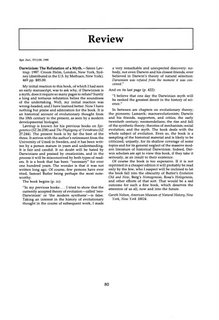I'm saving a few things from the
Panda's Thumb. I suppose I won't bother with them anymore now that they censor everything, in this case including some accurate history with respect to
Benjamin Franklin and Congress that refutes the ignorant and bigoted judgments typical to federal judges these days. Such information is on topic, they are just more interested in their form of scientism as applied to politics than the truth. I.e., they're interested in the mere label of "science" that they do not even define as the pursuit of the truth anyway.
Here is some of what I wrote mixed in with a few murmurings and mewlings from those with the urge to merge.
---
Actually the Panda's Thumb does censor many people that you're apparently not counting, often when things go against the Leftist way the mewlings and murmurings begin, which indicates that they're typically more concerned with politics and labeling things "scientific" than what is true. That's what the original post of this thread is about, the conflation of the term "science" with all that Leftists happen to believe. That has been going on over a century, ever since modern science emerged from Christianity and the general revelation typical to the Greek philosophers with their Forms and Unmoved Movers.
Unlike Marx, modern Leftists do not seem to be very honest about what they are actively doing. Instead they pretend to be doing nothing and science just happens to be defined by and as everything that they say about it. E.g. they claim that science is at "war" with Christianity instead of just admitting that
they are making war on Christianity, regardless whatever systematic thought as applied to empirical evidence may indicate. In fact, the very definition of science that they try to prop up politically is that "science" is opposed to or utterly distinct from religion. For if it comported with religion in any way then it could not be taught in science class given the perversion of the separation of church and state into the separation of religion and state and then into the separation of whatever "offends" some atheistic kook and state. Given that effeminates offend easily, that's a lot of separation, and about the only separation or discrimination that those with the urge to merge will allow.
KL
Posted: Jan. 24 2006,17:14
Regarding comment 75444:
Jesus, mynym!!! What are you smoking? Larry makes WAY more sense than you. [See, at least a new threat to their urge to merge takes the heat off of other people. But I'd suggest that anyone tempted to write there let the dead in the head bury their dead. That's what their Mommy Nature selects for them by natural selections anyway.] Do you have any training or education in the sciences? My teenage son is more coherent than this on his worst day.
Flint
Unregistered
Posted: Jan. 24 2006,17:14
[...]
And finally, here is mynym who seems to think if he mislabels evidence "leftist politics", then he doesn't need to ever notice the stuff.
Any more evasion and distortion and maybe I'll convert to creationism myself. That's mighty compelling.What a grouchy, unpleasant fellow you are, mynym! How perfectly you exemplify EVERYTHING not only wrong, but unpleasant, about creationists (under whatever cover name).mynym
Unregistered
Posted: Jan. 24 2006,17:42
If those with the urge to merge found my writing pleasant just as they seem to like the uncivilized and censorious politician above then I would be concerned that I was not making enough separations, discriminations and that
type of thing. It's good to see that is not the case. Of course you didn't really say anything about the perversion of separation of church and state from the intentions of Founders like Franklin that leads into absurd situations like some federal judge trying to define "religion" and "science" for everyone, but that's to be expected.
mynym
Unregistered
Posted: Jan. 24 2006,17:42
First, Atheism is a religion. It’s fairly relevant under the separation clause that atheists be protected equally with others, but likewise, through your own statement, science cannot possibly comport with atheism (a religion)...Atheism is no more a religion than is theism, there are various sects of theists and atheists but neither philosophical position is sectarian nor a full "system of beliefs."
Thus, how is there a war against religion going on, when the very material you asserted is being used in this war is, in fact, not allowed to be used by your own assertation?The material being used is a pattern of outright frauds combined with distortions of the evidence based on the capacity for a paradigm to sift evidence with the remainder cloaked in the pollution of language in terms like "evolution" which can encompass all "change" that takes place in the Cosmos yet is supposedly specific enough for very specific statements.
Second, the correct statement is that science will not comment upon religion in either a positive or negative manner. It simply gives it the cold shoulder, so to speak, and moves on with science regardless of the existence of religion. Why? Because science (correctly) asserts that it has no standing to comment on spiritual matters, as the very fundamental principle of naturalistic methodology removes the ability of science to say anything meaningful about religion.In the past that has been the way that science has been set up to be a methodical way of denying all spiritual matters and all that is essential as not "existing." (I.e., enter the Flying Spaghetti Monsters, Pink Unicorns and Santa here.)
And when people set out to correct the mistaken belief that science is constantly and methodically building up "natural" answers the first to try to stop them are people like those who post on the Panda's Thumb. E.g., if I were to begin a criticism of the way that science has been defined as a methodical way of coming to a materialist or naturalist philosophy (by materialists, surprise, surprise) then writers here would be the first to try to disagree with and reject such criticism.
Rather than arrogantly assert faith as fact, science takes the much more humble stance of admitting what it doesn’t know and not trying to convince anyone.That's silly. Scientists advance their hypotheses based on something and someone looking in from the outside may even think that they sometimes stick to them against the facts based on the faith that they will be vindicated. They also try to convince people.
Third, how do you comport your statement with the fact that the vast majority of scientists identify themselves as part of a religious group?For one thing, my statement was about the way that charlatans have abused science and tried to not only set it against religion, but define its very nature as being at best a different answer than a "religious answer" and at worst eliminative of a "religious" answer. I.e. religion is treated as heretical, this comes up in anything from catastrophism in geology to Darwinism in biology. It's not really clear sometimes how the "scientific answer" elimiates the "religious answer." E.g. a "morphogenetic field" is the "cause" of an embryo coming together vs. God knitting together in the womb, for where do the laws of Nature reside? Or is it that God is unnatural, yet science is natural? Why are some selections called natural selections yet it is pretended that others would be what, unnatural?
I am not, of course, referring only to christians here, but the vast multitude of hindu, muslim, jewish, buddhist, etc, etc, etc scientists across the entire world who believe in evolution.I believe in evolution. Why do you think that I don't? You're probably using the word in an odd way if you cannot understand how I can easily believe in evolution.
---
I suppose I won't bother now that the ID fellows have gone and given those with the urge to merge the opportunity to censor, which is what they wanted to do all along as revealed by their own words. It is odd though, that the ID types who are all about their "uncommon dissent" and so on would censor too. It makes me wonder about ID, perhaps everyone is tending towards the stifling and totalitarian views typical to scientism these days. At any rate, I'm generally not going to write where the sweaty little hands of the censor are at work.


























